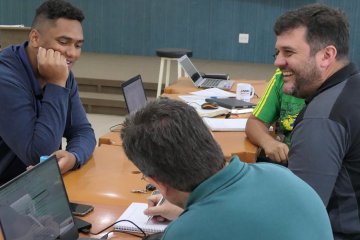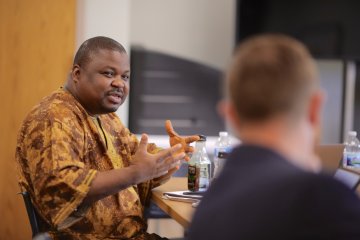Why Asking "Do You Agree with Our Statement of Faith?" Is Not Enough
 Darren Carlson
Darren CarlsonWe have a question on our application for those who wish to be mentored and sent to bring sound theological training around the world. One of those questions has to do with our Statement of Faith. It's a fair question and quite normal. We want to know if an applicant subscribes to what we believe. We use two confessions for our teachers, with The Gospel Coalition Confessional Statement being what all teachers must subscribe to.
As I have interviewed over 100 people to be sent, I find that most just skip the question as to whether they gladly agree and just mark yes. Most are innocent. I have had a number of Presbyterians tell me they subscribe to the Bethlehem Baptist Elder Affirmation of Faith in their application. This always puzzles me and upon further review, the applicant realizes they just checked the "yes" box. To be fair, there are also many Reformed Baptists who do not know the content of what they have signed off on.
“As I have interviewed over 100 people to be sent, I find that most just skip the question as to whether they gladly agree and just mark yes”
This is no minor issue for us. We are sending people to teach doctrine to pastors and leaders. The teacher must have conviction on what they believe and not so easily mark “yes.” I believe what has happened is that some people want to be associated with the Young, Restless, Reformed Movement, but they have yet to put the work in and cannot explain the foundational theological underpinnings of Reformed doctrine. I remember Josh McDowell used to stir up parents by showing them that high school kids had no idea how to articulate a Christian worldview. I now find that college and graduate students along with some pastors like being associated with the hip Reformed movement, but they don’t really know the statement of faith they say they subscribe to. Obviously, Christians have varying degrees of maturity, but when it’s a teacher, the stakes are very high and the consequences great.
Situations like these are very serious when interviewing a pastor/elder for a position in a church or a professor for a seminary post. Many churches and seminaries have lost moorings because people have hired friends whom they like who seem to love Jesus with almost total disregard for their personal statement of faith. Sometimes no questions are asked. Other times the person being interviewed is “close enough” in agreement and the person is hired. Need examples?
A brother in the Lord recently interviewed for a position at an evangelical school. He does not agree with part of their statement of faith. But no big deal, he is now a professor. They didn’t press him on the statement of faith, but asked if he agreed and crossed their fingers because he is such a fine scholar. He said he could work within the boundaries of their statement, but he personally does not agree.
There are a number of evangelical churches close to me where the senior pastor does not agree with part of the statement of faith of the church. I have seen churches appoint elders by asking them if they agree with the statement of faith and leaving it at that. Of course, those same men can’t even tell you the content of the statement of faith.
Just asking, “Do you agree” is a sign of terrible shepherding. What we believe about God is the most important thing about us. The church uses confessions to protect, unite, and worship. If your church or organization does not take them seriously, you will eventually be torn apart from the inside.
Take doctrine seriously. While it is fair to ask, “Do you agree,” let’s not stop there. I don’t care if someone has been ordained, passed test after test in theological studies, or written wonderful papers and articles. I still will ask for an explanation and defense of what they believe. In doing so I safeguard TLI. Will you safeguard your church or organization?
Darren Carlson serves as the International Director and Founder of Training Leaders International. He founded TLI in 2009 and continues to advance its mission of strengthening churches worldwide through theological education. Darren holds two master's degrees from Trinity Evangelical Divinity School and a PhD from the London School of Theology. You can connect with him on X.



